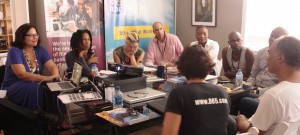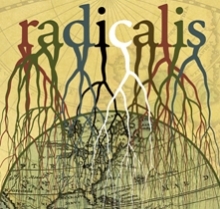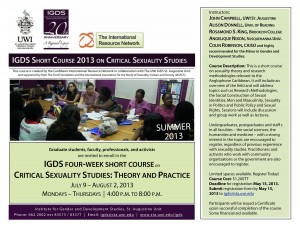Abstracts due June 10, 2013. Final submissions due by October 30, 2013.
Afrofuturism, is a transnational, diasporic, and cultural aesthetic that interrogates the past, present and future in literature, technology, art, or music, and challenges Eurocentric motifs of identity, time and space. While this approach has grown in the past decade, there has been limited engagement with Afrofuturism’s relationship to the discipline of Africana studies, or Africology.
We are soliciting scholarly research, theoretical essays, and applied studies that explore how the concept of Afrofuturism is related to Africana Studies for an anthology.
Manuscripts addressing the following themes will be given priority:
• The intersection of race, gender, sexuality, and technology in human interaction (i.e., examining identities, in communications and new technologies).
• Afrofuturism as philosophy and its impact on religion among African/Diapora communities (ie., metaphysics, theology, philosophy of science and ethics).
• The confluence between Afrofuturism, the environment, bio-sciences, transhumanism, and cyborg manifestations.
• The interstices of time, place, space, and home as metaphors for an Afrofuturist perspective or politics, especially in relation to neoliberal rhetorics of post-racialism, open data movements, radical transparency, crowd sourcing and other forms of political expression in the age of what some call “zombie” or “disaster” capitalism.
• Afrofuturism in relation to other futurisms; such as Rastafuturism, Chicanafuturism, Occidental futurism or Techno-Orientalism.
• Theories of Afrofuturism that explore aesthetics, literature, music, graphic arts, and performing arts, including graphic novels, sequential art, manga and anime.
Authors are to submit a 250-300 word abstract for consideration by the editors by June 10, 2013. Authors of accepted abstracts will be notified by July 10. Final submission will be due by October 30, 2013. Final submissions may not exceed 25 pages and must include: (1) detachable title page with names of author(s), academic position, institutional affiliation, full address, telephone number, fax number, and email address. All manuscript submissions must conform to the current Chicago Style format.
Queries and abstract submissions should be addressed to: Reynaldo Anderson, co-editor, Department of Arts and Sciences Room 208, Harris-Stowe State University, Saint Louis, MO, Email: [email protected] Office: 314-340-3691; and Charles E. Jones, co-editor, Department of Africana Studies, 3264 French Hall P.O. 210370 University of Cincinnati, OH, 45221-0730 e-mail: [email protected] 404-435-7429.
Via the Critical Caribbean Studies list-serv from Rutgers University-New Brunswick




